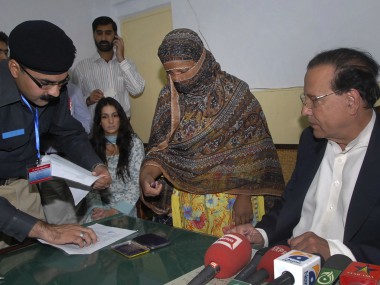Islamabad: Pakistan’s Supreme Court is due on Wednesday to rule on the final appeal by a Christian woman sentenced to death by hanging over blasphemy allegations, a case that has drawn global attention and condemnation.
Asia Bibi, a mother of four, has been living on death row since 2010 when she became the first woman to be sentenced to death under Pakistan’s draconian blasphemy laws.
She was condemned for allegedly making derogatory remarks about Islam after neighbours objected to her drinking water from their glass because she was not Muslim. Her case has outraged Christians worldwide and been a source of division within Pakistan, where two politicians who sought to help Bibi were assassinated.
A special three-person bench headed by Pakistan’s top judge, Chief Justice Saqib Nasir, is due to deliver the verdict at 9 am local time (0400 GMT), according to a notice by the court.
Bibi’s case is also high on the agenda of religious hardliners in Pakistan, many of whom are fiercely opposed to her release.
The ultra-Islamist Tehreek-e-Labaik Pakistan (TLP) party, which makes punishing blasphemy its main campaign rallying cry, earlier this month warned the court against any “concession or softness” for Bibi.
“If there is any attempt to hand her over to a foreign country, there will be terrible consequences,” TLP said in a statement. In November, TLP staged a crippling blockade of the capital after small changes to a religious oath, which it claims was tantamount to blasphemy. Seven people were killed and more than 200 wounded in clashes with the police and TLP’s supporters only dispersed after striking a deal with the military.
Insulting Islam’s prophet is punishable by death under Pakistani law, and blasphemy accusations stir such emotions that they are almost impossible to defend against. Dozens have been killed following blasphemy claims, sometimes by mobs of men.
Rights groups say the blasphemy law is increasingly exploited by religious extremists as well as ordinary Pakistanis to settle personal scores. The law does not define blasphemy and evidence might not be reproduced in court for fear of committing a fresh offence.
Bibi has always denied blaspheming and her representatives have claimed she was involved in a dispute with her neighbours and that her accusers had contradicted themselves.
In February, Bibi’s husband Ashiq Masih and one of her daughters met with Pope Francis shortly before Rome’s ancient Colosseum was lit in red one evening in solidarity with persecuted Christians, and Bibi in particular.
Pope Francis told Bibi’s daughter: “I think often of your mother and I pray for her”. At the Rome gathering, Masih said his wife was innocent of blasphemy. “This is just hate against Christians, who are considered impure,” he said.


)




)
)
)
)
)
)
)
)